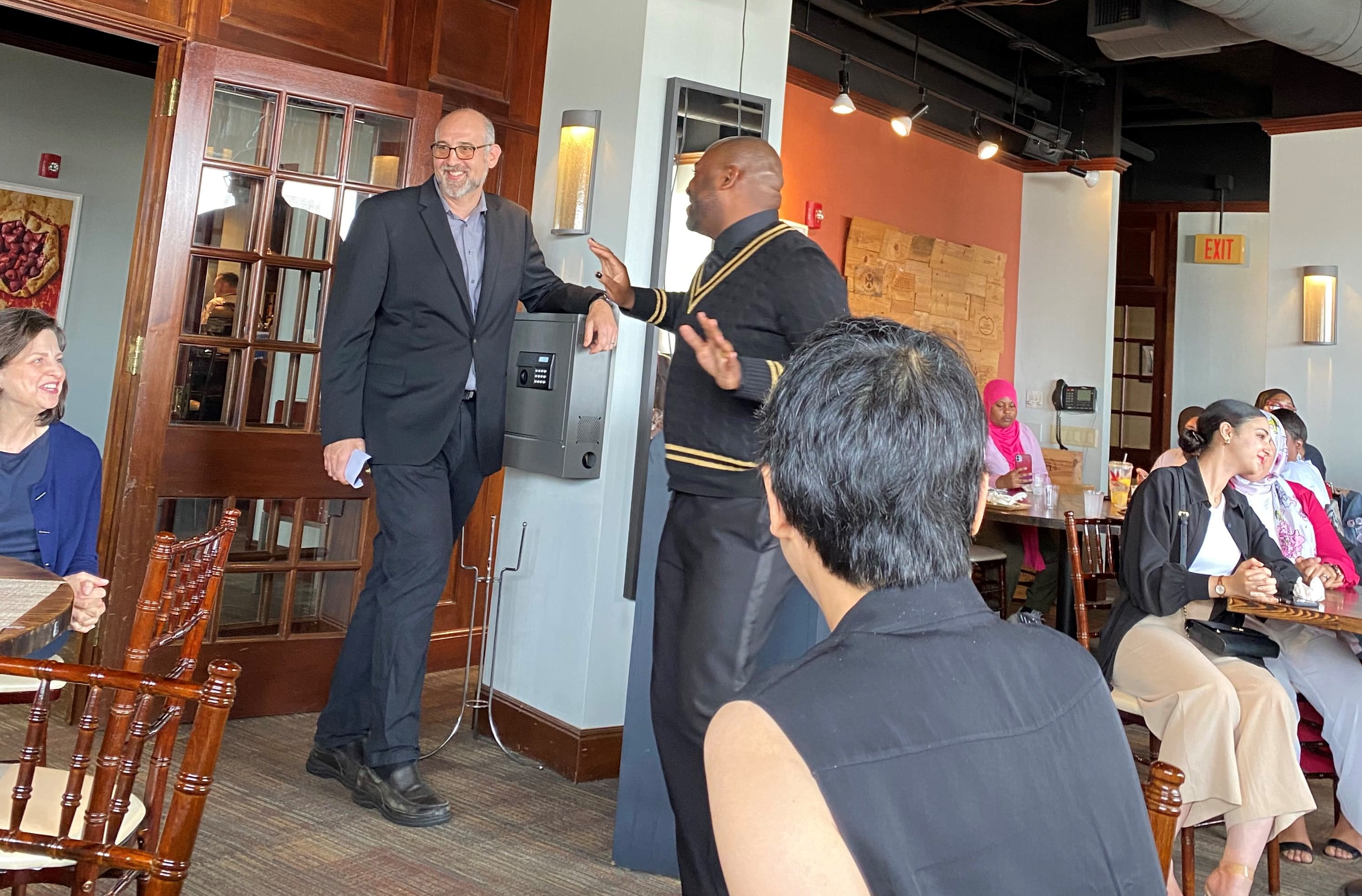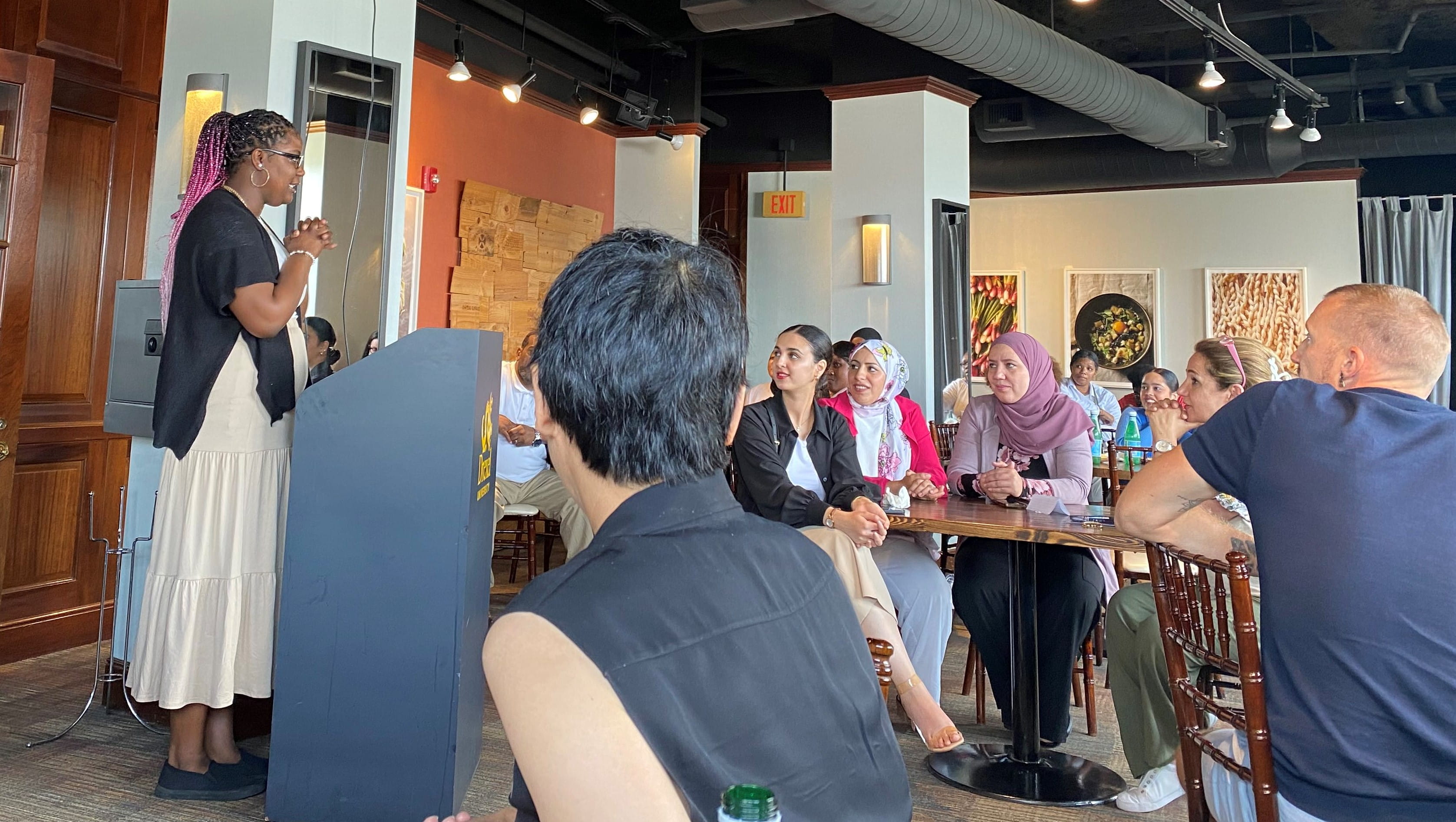Elevating Partnership
By Natalie Kostelni

In the spring of 2021, Jonathan Deutsch, professor in the Departments of Food and Hospitality Management and Nutrition Sciences, was having coffee with Ellen Yin when the conversation turned to the difficulty of filling jobs at her Philadelphia restaurants.
Yin, a James Beard Award-winning restauranteur who operates High Street Hospitality Group, and her counterparts throughout Philadelphia were struggling to find people to fill vacancies — a lingering byproduct of the pandemic. “We need help,” Deutsch recalled Yin saying.
That plea set into motion what is now the Drexel Hospitality Workforce Training Program, which is managed by the Drexel Solutions Institute and funded through $80,000 secured through a PAsmart grant. The training program convenes University faculty, industry partners such as High Street and other experts to support, train, and upskill those seeking employment in the food and hospitality industry.
The training program serves as one example of the myriad of partnerships Deutsch has forged that enhance his academic, research and food product development work and help position Drexel as a go-to institution for companies and nonprofits to help solve some of their most pressing challenges.
Drexel’s work with external partners has also led to additional hands-on academic offerings.
“Our North Star is experiential learning,” Deutsch said.
From Bimbo to the Almond Board of California
At Drexel’s Department of Food and Hospitality Management, housed in the College of Nursing and Health Professions, much of the experiential learning takes place in the Drexel Food Lab. Established nearly a decade ago by Deutsch, who serves as director, and Alexandra Zeitz, who was then an undergraduate student, the Food Lab is an interdisciplinary food product design and culinary innovation research space solving real-world problems in sustainability, health promotion and access.
Food Lab clients range from start-ups such as Saint Lucifer and Soom to multinational companies including Aramark, Bimbo Bakeries USA, Hershey and McCormick. The Lab also works with government entities and nonprofits such as the Philadelphia Department of Health, World Wildlife Fund and Cook for Your Life.
Through the Lab and these courses with partners, students begin to understand consumers as well as develop new food products. For example, the Food Lab worked with Amoroso’s Baking Co. to develop recipes for a reduced sodium roll, Aramark on concept development of vegetarian and vegan recipes, and packaging design for Pure Fare, a Philadelphia startup focused on grab-and-go foods.
Each year, the Food Product Development class works with an industry partner who serves as a real-world client for students. Who that partner will be this year hasn’t been determined: “It depends on who is a good fit,” Deutsch said.
There are regulatory or equipment issues to consider. The partner needs to have a broad enough scope with some complexity; it can’t be as simple as devising gluten-free brownies; “We already know how to do that,” he said.
The lab worked last year with Mother Butter, a locally owned and produced seed butter company to ideate over 50 snack concepts. This year, it also collaborated with the Almond Board of California to create new snacks featuring the nut that would appeal to younger demographics.
“One of the pillars of Drexel University's Strategic Plan is 'Powerful Partnerships' and the project with the Almond Board represented a perfect example of a partnership that integrates classroom learning, applied research in food and health, and experiential learning, all under the umbrella of food entrepreneurship and innovation,” Deutsch said.
The partnership between the Almond Board and Drexel involved a first-ever competition among students who had their snack concepts judged by a panel of experts in food, culinary science and product marketing.
The judges selected almond granola butter cookie dough snack bites created by culinary arts and science majors Grace Mailey and Gabriel Marchiony. Their recipes incorporated almond protein powder, almond butter, almond flour, almond milk and other almond ingredients into the recipe.
While the Food Lab provides students with experiential learning opportunities, it also engages students on research projects. These allow companies to work with students and offer experiences that could make them a good fit as future employees. Students also get exposed to areas of the food industry that may lead to new passions.
“The magic of the Food Lab is the experience students get from it,” Deutsch said. “They are working over months and years with companies on products and are on a first-name basis with the heads of R&D, a CEO of a startup or the senior vice president of marketing. These opportunities provide students with rich experiences. They know the product, build a rapport with these executives and are often hired by these employers. Students become colleagues.”
Deutsch, who is also a Provost Solutions Fellow, also launched an Innovation Engine course called “Garden to Table Cooking” (CULA T280) with Longwood Gardens. Innovation Engine courses involve experiential learning that uses interdisciplinary solutions to tackle a real-world problem facing an external partner that is directly involved in the class.
Students in Drexel’s Culinary Arts program as well as those majoring in business, engineering and arts were enrolled in the Garden to Table course first held last summer and again this summer. Students were exposed to various aspects of Longwood’s restaurant operations and capped the term off by creating dishes using produce grown at Longwood. Longwood’s restaurant manager tasted and provided feedback on their work.
From Sustenance to Culinary Career
Deutsch’s interest in food was stoked at a young age, facing a situation common to kids with busy working parents. “I like to eat and the surest way to eat what I wanted was to make something myself,” he said. “My parents were thrilled.”
Those early experiences led to Deutsch earning a culinary degree from the Culinary Institute of America, bachelor's degree in hospitality management from Drexel (‘99) and doctoral in food studies and food management from New York University. As a classically trained chef, Deutsch has worked in food product development, small luxury inns and restaurants.
Prior to coming to Drexel in 2013, he established the culinary arts program at Kingsborough Community College, City University of New York and a PhD concentration in food studies at the CUNY Graduate Center and School of Public Health.
The workforce training program highlights how Drexel’s expertise supports external partners and, in this case, the local economy and those seeking a new career. The program aims to increase the number of people trained to work in Philadelphia’s hospitality and food service industry as well as potentially enrolling in post-secondary culinary and hospitality education.
The program involves nine corporate partners including High Street, DiBruno Brothers, Harrah’s and Compass Group. Non-profit partners include The Enterprise Center; and Cooks Who Care, which provides services to support the mental wellbeing of those in the food and beverage industry.
Drexel held the first training in the fall and, in late June at the Academic Bistro, 28 students comprising the second cohort completed the program and received certificates at a celebratory luncheon. Yin attended as a speaker and supporter. “You can take this career anywhere it is that you want to go,” she told the graduates.
High Street hired a graduate from the first cohort, Kay ‘Stienna Carter, who works at Yin’s flagship restaurant Fork in Old City. In a speech to the new graduates, Carter spoke of feeling stuck in a dead-end job at a convenience store. “I wanted more for myself,” Carter said. “I knew I wasn’t where I wanted to be.”
Carter relocated back to her hometown of Philadelphia and enrolled in the training program that helped land her a new career. “I gained knowledge and inspiration and found elevation,” she said. “I found that I was so much more.”

Kay ‘Stienna Carter speaks to the new graduates.